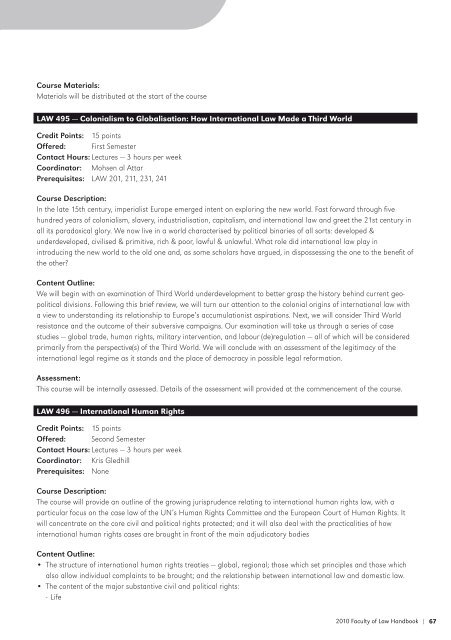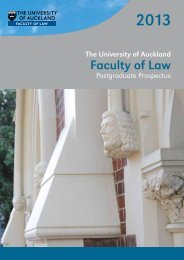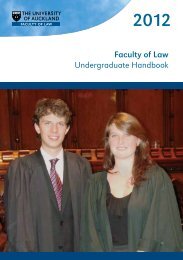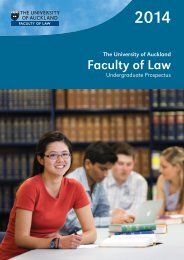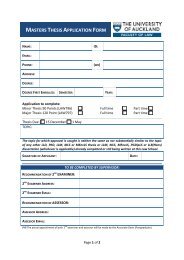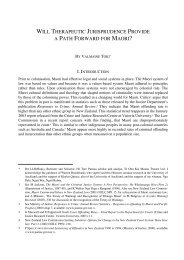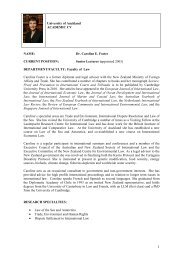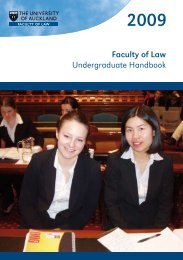Faculty of Law Undergraduate Handbook - Faculty of Law - The ...
Faculty of Law Undergraduate Handbook - Faculty of Law - The ...
Faculty of Law Undergraduate Handbook - Faculty of Law - The ...
- No tags were found...
Create successful ePaper yourself
Turn your PDF publications into a flip-book with our unique Google optimized e-Paper software.
Course Materials:Materials will be distributed at the start <strong>of</strong> the courseLAW 495 — Colonialism to Globalisation: How International <strong>Law</strong> Made a Third WorldCredit Points: 15 pointsOffered: First SemesterContact Hours: Lectures — 3 hours per weekCoordinator: Mohsen al AttarPrerequisites: LAW 201, 211, 231, 241Course Description:In the late 15th century, imperialist Europe emerged intent on exploring the new world. Fast forward through fivehundred years <strong>of</strong> colonialism, slavery, industrialisation, capitalism, and international law and greet the 21st century inall its paradoxical glory. We now live in a world characterised by political binaries <strong>of</strong> all sorts: developed &underdeveloped, civilised & primitive, rich & poor, lawful & unlawful. What role did international law play inintroducing the new world to the old one and, as some scholars have argued, in dispossessing the one to the benefit <strong>of</strong>the other?Content Outline:We will begin with an examination <strong>of</strong> Third World underdevelopment to better grasp the history behind current geopoliticaldivisions. Following this brief review, we will turn our attention to the colonial origins <strong>of</strong> international law witha view to understanding its relationship to Europe’s accumulationist aspirations. Next, we will consider Third Worldresistance and the outcome <strong>of</strong> their subversive campaigns. Our examination will take us through a series <strong>of</strong> casestudies — global trade, human rights, military intervention, and labour (de)regulation — all <strong>of</strong> which will be consideredprimarily from the perspective(s) <strong>of</strong> the Third World. We will conclude with an assessment <strong>of</strong> the legitimacy <strong>of</strong> theinternational legal regime as it stands and the place <strong>of</strong> democracy in possible legal reformation.Assessment:This course will be internally assessed. Details <strong>of</strong> the assessment will provided at the commencement <strong>of</strong> the course.LAW 496 — International Human RightsCredit Points: 15 pointsOffered: Second SemesterContact Hours: Lectures — 3 hours per weekCoordinator: Kris GledhillPrerequisites: NoneCourse Description:<strong>The</strong> course will provide an outline <strong>of</strong> the growing jurisprudence relating to international human rights law, with aparticular focus on the case law <strong>of</strong> the UN’s Human Rights Committee and the European Court <strong>of</strong> Human Rights. Itwill concentrate on the core civil and political rights protected; and it will also deal with the practicalities <strong>of</strong> howinternational human rights cases are brought in front <strong>of</strong> the main adjudicatory bodiesContent Outline:• <strong>The</strong> structure <strong>of</strong> international human rights treaties — global, regional; those which set principles and those whichalso allow individual complaints to be brought; and the relationship between international law and domestic law.• <strong>The</strong> content <strong>of</strong> the major substantive civil and political rights:- Life2010 <strong>Faculty</strong> <strong>of</strong> <strong>Law</strong> <strong>Handbook</strong> | 67


